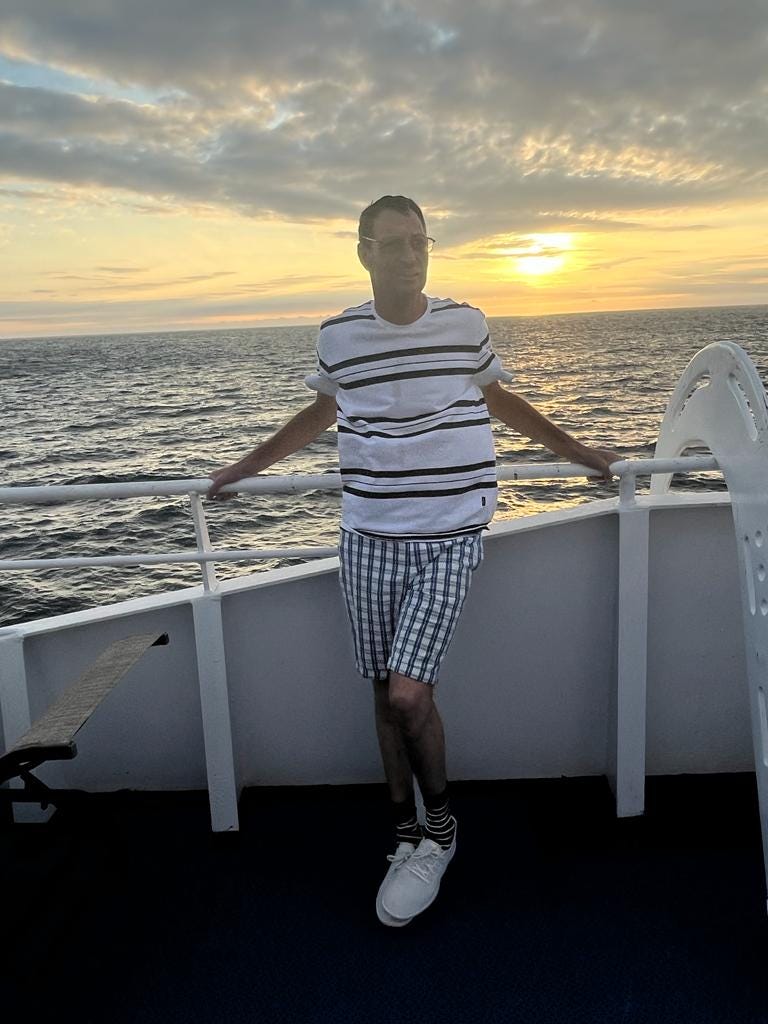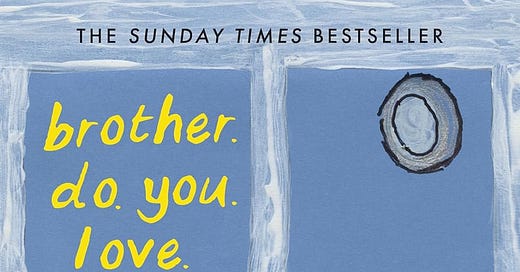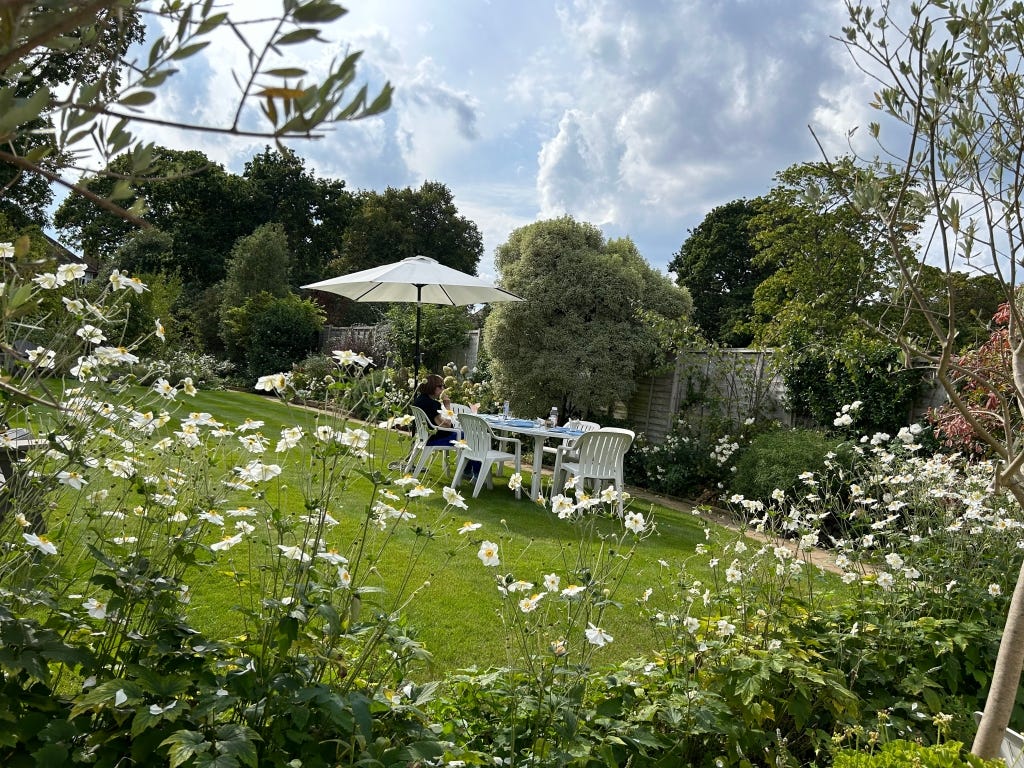Blog 119 - brother.do.you.love.me
I came upon this remarkable book by chance, hearing a snippet of a Radio 4 interview with Manni and Reuben Coe whose story it is.
Reuben (or Reubs as he is known) has Down’s Syndrome. Manni is his elder brother. Saying that Reuben has Down’s Syndrome rather than that he is Down’s Syndrome is important. Reubs is a person who has Down’s - but he is not defined by it.
The tale wanders, the timelines are sometimes unclear, the text can be repetitive. For me that’s part of what is so special about Coe’s writing. Reflective of the pattern of life with Reubs, it somehow captures its essence; complexity and simplicity, love and frustration, inspiration and exhaustion all wrapped up together.
Forty-two and a half years ago, my wife and I discovered that our third child, our first son, James had “learning difficulties”. Or, in the unvarnished language of that time, he was mentally handicapped.
It wasn’t Down’s. There was no label. But we were told to expect that James might never talk or walk. This just months after I had given up a secure junior partnership in a successful law firm, to branch out on my own.
Challenging!
Forty something years later James’s life has been an extraordinary success. He runs half marathons (in around two hours), he is a member of a kibbutz in Galilee, which caters to the needs of people with disabilities, where he is a well-liked and valued member of the team responsible for the kibbutz’s organic vegetable farm. He trains in the gym, swims, rides horses, is sociable, loves to travel and enjoys life to the full as a much-loved member of our family,

How did this happen? It was a long and wondrous journey.
Which no doubt is why the story of Reubs, as told by his brother, speaks to me so profoundly. We learn how Covid lock downs were so damaging, the physical and social isolation of a care home reducing him to a shadow of his former self. Having become non-verbal and, as a result of muscle atrophy, unable to walk any distance, Reubs is literally rescued by his brother. The story tells how together, outside the care home system but with the love and support from so many friends, they overcome every sort of challenge to restore and develop Reubs' capabilities, thereby enabling a life of his own.
Our son’s story is different of course, but the parallels with Reubs’ journey are striking . So many lines written by Manni Coe could have been written about our life with James.
But this blog is not really about James. That’s for another day - maybe. I am going somewhere else.
In April 2022, celebrating what we thought was the end of Covid, I was visiting Namibia with my wife Susie, James and one of our daughters and her family. Having avoided Covid for two years, despite having travelled extensively between London, Israel and South Africa and therefore believing myself immune, I was struck down. We were only in civilisation for one night. The other nights were in lodges far from anywhere. Almost certainly I became infected in the one rather crowded restaurant we had visited. Travelling the next day, I started to feel unwell. I thought it was flu. It wasn’t. During the night, by then deep in the interior hours by road from civilisation, I became horribly unwell, dehydrated, unable to swallow and gasping for breath. Susie and the lodge where we were staying were magnificent. In no time, it seemed, they had arranged an emergency air ambulance to ferry me to hospital in Windhoek.
.
I shall ever be grateful to the respiratory team at the Lady Pohamba Private Hospital in Windhoek, a modern purpose-built new facility, which stabilised me and undoubtedly prevented me dying. However, what they didn’t have were the new anti-viral drugs by then available in the developed world which, if administered within a few days of Covid infection, were designed to prevent often dangerous complications.
Still weak and completely lacking in energy I was discharged, there being nothing further that the hospital could do for me.
Next challenge. Getting back to London.
I knew that having had Covid, to be allowed on to the aircraft taking us back I would need to produce a medical certificate that I was fit to fly. This had necessitated the day before my undergoing an array of tests. Among them was a punishing lung function test, which I really don’t know how I passed. Phew! Alas, whilst literally waiting to board I was informed that there was a problem. The certificate needed the signature of the doctor who had actually conducted the tests. Without this I would be denied boarding. And this being a Friday afternoon, the doctor had gone away for the weekend and was uncontactable.
Ouch!
Fortunately, whilst having the tests, I had become friendly with the head nurse who had administered them. Although about to go off duty, somehow she located the doctor on his cell phone and, with just a few minutes before boarding, she managed to obtain and send through the missing signature.
I made it home, just. It wasn’t an easy flight. Seeing me struggling out of the airport, Susie drove me immediately to our doctor’s surgery where, again fortunately for by now it was a Saturday morning, our own family doctor was on duty. After only a brief examination his verdict was clear. “You need to be in hospital. Urgently. Go home, collect your gear and wait for my call to tell you where I can get you admitted”.
Which is how that afternoon I began a nine day stay in isolation in the world class infectious diseases unit on the 11th floor of the Royal Free Hospital, receiving treatment for what I soon learned was double pneumonia.
To refer to the Royal Free as a hospital is something of a misnomer. As I was to discover during my stay, it’s so much more than that. Almost a city in itself, perhaps it is better understood as a huge health factory employing more than 10,000 staff, many working in the theatres, imaging and data processing departments and extensive laboratories which underpin the 839 bed specialist treatment wards.
It was the availability of these laboratories, with their skilled pathologists, that got me well. The pneumonia was pernicious, initially not responding to the drugs with which I was being treated. The infection markers and other vital signs all going in the wrong direction. It was only after several days that the labs worked out a cocktail of drugs which did the trick.
The Royal Free is a strange place. With everyone wearing identical blue scrubs and plastic coveralls it was hard to know who was a doctor and who was a cleaner; except the doctors generally wore stethoscopes. The medicine was undoubtedly first class. The nursing rather less so, occasionally superb (and what a difference that made) but often inadequate, especially at night, personal care hardly existent, the food simply horrible, the room in which I was confined, though benefitting from large windows overlooking Hampstead Heath, showing its age, the cleaning and maintenance erratic. Nevertheless, the Royal Free undoubtedly also saved my life; untreated pneumonia in an already Covid weakened body is all too often lethal.
Last December I celebrated my 80th Birthday. No one more astonished than me. There were many delightful happenings, culminating in a Birthday Ramble on Hampstead Heath (the weather was kind) and a sit-down pub lunch for as many friends who could crowd in. It was not really an occasion for speeches. But I did get to tell a couple of stories.
The first was this ancient Chinese story of the Stallion
The Stallion…
And old farmer lives on his farm with his teenage son. He also has a beautiful stallion that he lovingly cares for.
The farmer enters his stallion into the annual country fair competition. His stallion wins first prize. The farmer’s neighbours gather to congratulate him on this great win. He calmly says, “Who knows what is good and what is bad?” Puzzled by this reaction, the neighbours go away.
The next week, some thieves who heard about the stallion’s increased value steal the horse. When the neighbours come to commiserate with the farmer, they find him again very calm and gathered. He says, “Who knows what is good and what is bad?”
Several days later, the spirited stallion escapes from the thieves and finds his way back to the farm, bringing with him a few wild mares he has befriended along the way. To his neighbours’ excited rounds of congratulations, the old farmer once again says, “Who knows what is good and what is bad?”
A few weeks later, the farmer’s son is thrown off one of these new mares as he is trying to break it in, and his leg is fractured. As the neighbours gather to commiserate with the old farmer, he once again reminds them, “Who knows what is good and what is bad?”
The following week, the imperial army marches through the village, conscripting all eligible young men for the war that has just broken out. The old farmer’s son is spared due to his fractured leg. The neighbours no longer bother to come to the old farmer to congratulate him. By now they know what his response will be: “Who knows what is good and what is bad?”
The second story came from a delightful little paperback book “Recovery The lost Art of Convalescence” by Dr Gavin Francis given to me whilst I was in the Royal Free.
In a chapter entitled “The (occasional) advantages of illness” Gavin tells how
“Some years ago…. I looked after two men, both middle-aged, who a few weeks apart both suffered a cardiac arrest and collapsed, ostensibly dead, but who were successfully resuscitated with electric shocks. Both were then fitted with portable electronic defibrillators that were implanted beneath the skin of their left collarbones and wired directly into the heart. The defibrillators were about the shape and size of a matchbox or a Zippo lighter, and were clearly visible bulging under the skin. If either man was again to collapse with an erratic heartbeat, the portable defibrillator would sense the change and shock the heart back into a healthy rhythm.
For one of the men, his intimate experience of the proximity of death, the fragility of life and his new reliance on the implanted defibrillator was utterly traumatic. He began to suffer panic attacks and fiddled ceaselessly with the swelling beneath his collarbone. He couldn’t find a way to stop fretting that it might fail. At the time of his cardiac arrest he had been working as an administrator, but he found himself unable to go on working. He was afraid to be alone, and his nights became a torment of insomnia.
For the other man, the almost identical experience of collapse and then resurrection became an epiphany of gratitude. His new life was a gift, he said, for by rights he should now be dead, and all the tedious, niggling irritations that once troubled him seemed to dissolve. It was enough to be able to breathe this air, walk on this earth, see his grandchildren. He had always lived modestly, but now began to enjoy sumptuous meals, fine wine, and booked holidays to places he would never before have considered visiting. He had died, but then he lived again, and that new life into which he was born seemed one of richness, tenderness and gratitude.”
As I said to my friends gathered in the pub “That second man is me.”
Twice due to good fortune, in situations which could have gone either way, my life had been saved.
My stay in the Royal Free was followed by an eight-week period of convalescence during which, thanks to wondrous care, slowly but steadily I recovered my health and strength. It was spring and early summer. The weather was kind, our garden at home a delight.
I was exuberant, waking to greet each day with appreciation for just being, with gratitude for simply being alive. A state of mind which I enjoy to this day.
When I first heard the story of the Stallion I hadn’t worked out why it resonated so powerfully. It all made sense when I discovered this commentary:
“Things that appear to be bad may turn out to be good and vice versa. Rather than worrying about things that are beyond our control, we should accept uncertainty and focus on the present moment.
Embrace uncertainty: In today's fast-paced world, we often feel like we need to be in control of everything. The story of the Chinese farmer reminds us that there are many things that are beyond our control, and that's okay. We can't predict the future, but we can choose how we respond to it.
Be open-minded: The farmer's response to every situation in the story is a reminder to be open-minded. We tend to label things as either good or bad, but in reality, things are rarely that black and white. By being open-minded, we can see things from different perspectives and make better decisions.
Maintain a positive outlook: The farmer's attitude in the story is one of positivity. He doesn't see things as good or bad, but rather accepts whatever comes his way. This mindset can help us maintain a positive outlook in life, even in the face of adversity.”
“I don’t know if it’s good or if it’s bad” applies to so much of Reuben’s story. Languishing in the Portland Place care home during Covid, losing speech and bodily strength, was clearly bad. But looking at what it led to, rescue, the manifestation of incredible brotherly love, unimagined independence, pride and celebrity as the subject and co-author of a bestselling book, was it bad or was it good?
Likewise, for Manni, Ruben’s rescuer: total disruption to his life, anxiety, worry, frustration, fear all along the way. But was it good or was it bad?
These are Manni’s words at the end of his book:
“brother. do. you. love. me. is a story of change. I changed. Reuben changed. Reuben changed me. Part of us had morphed into the other. We had lived through something that was extraordinary.”
Back to James.
When James was born in 1980 we didn’t know his sex until the moment he was born. Having a son after two girls was extraordinarily exciting. We were established, had a nice home, and having brought two children to school age we were confident parents. Everything fine lay before us. Little did we know.
Parenting a learning-disabled child is incredibly challenging.
Nothing prepares one for what is involved. The early years especially were extraordinarily testing, for Susie as mother particularly but in different ways for us both. It’s enough to destroy any marriage, to upend any family. Yet somehow, miraculously it often seemed, we managed all of us to hold it together.
If nothing prepares one for what is involved in having a learning-disabled child, nothing prepared me for who James has become, for what I now feel.
Not for an instant during those early years could I have imagined the love which James would engender, the richness which he has brought not only to my life but to the lives of so many, the shared laughter and joyfulness, the extraordinary accomplishments, the beautiful relationships which have come as a result of him being who he is and so so much more that is good.
Manni Coe wrote that Reuban was a catalyst for change. He changed. He changed Manni. They had lived through something extraordinary.
So it has been with James. So much in life changed. James has changed. Having James has changed me. It feels like we too have lived and are continuing to live through something that is extraordinary.
Who knows what is good and what is bad?
smo/18.04.2024





